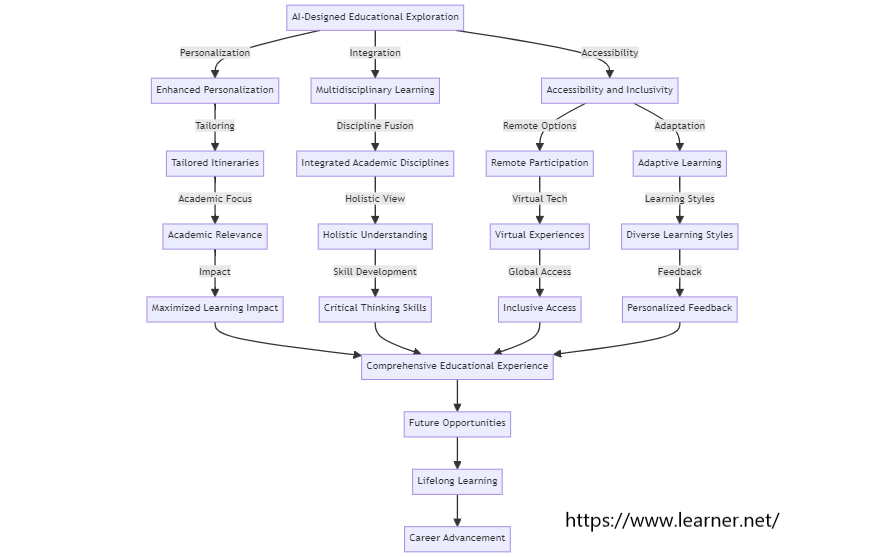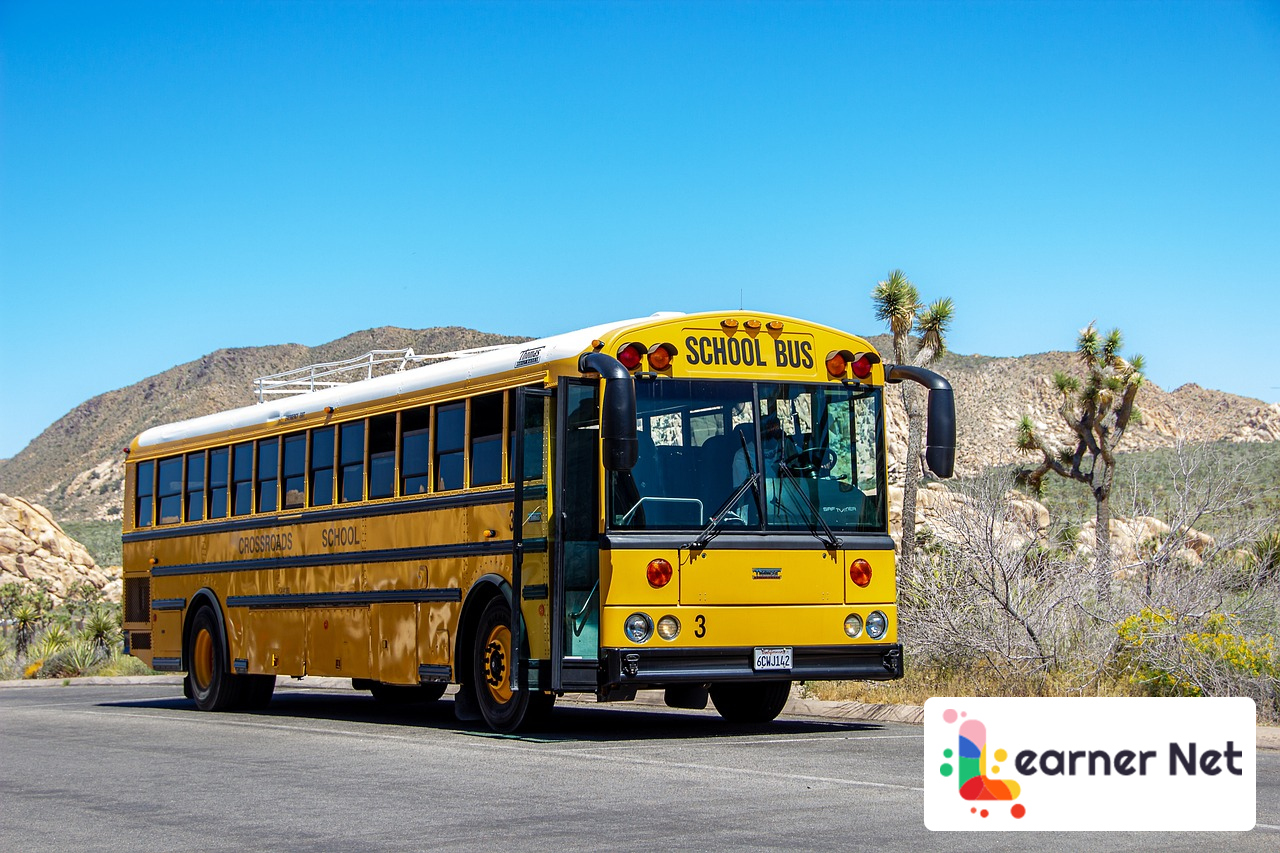AI-Designed Educational exploration and tourism have witnessed a sudden and perhaps even unexpected paradigm shift, revolutionizing the traditional approach to learning and travel. This shift comes by way of the incorporation of artificial intelligence or AI Assistant in crafting educational itineraries and travel experiences. This intersection marks a significant departure from conventional methods, paving the way for enhanced learning opportunities in more diverse and perhaps even more interesting settings outside of the traditional classroom.
The Intersection of Learning and Travel is a potent synergy that leverages the immersive nature of travel to augment educational experiences. According to a report by the World Tourism Organization, educational tourism has seen a steady increase, with travelers seeking intellectually enriching experiences. The melding of learning and travel facilitates a holistic approach to education, enabling individuals to acquire knowledge beyond the confines of traditional classrooms. This aligns with the evolving preferences of modern learners, who increasingly value experiential and practical learning.
AI-Designed Educational exploration cater to the contemporary learner’s need for personalized and flexible learning experiences. AI algorithms analyze individual preferences, learning styles, and academic requirements to craft tailor-made itineraries. This not only ensures relevance to the learner’s academic pursuits but also fosters a deeper engagement with the educational content. The integration of AI in educational travel adds a layer of sophistication, transforming the learning landscape.
In a global context, the demand for AI-Designed Educational exploration is on the rise. A study by the Global Artificial Intelligence in Education Market highlights the increasing adoption of AI in shaping educational experiences. The market’s projected growth substantiates the growing recognition of AI’s role in education, including its application in designing educational travel programs. The statistics underscore the industry’s responsiveness to the evolving needs of learners, acknowledging the potential of AI in creating innovative educational opportunities.
The significance of AI-Designed Educational exploration lies in their ability to transcend geographical and cultural boundaries, democratizing access to education. Learners can engage with diverse learning environments, explore historical sites, and interact with local communities, all facilitated by AI-driven educational travel programs. This democratization aligns with the United Nations Sustainable Development Goal 4, emphasizing inclusive and equitable quality education for all people around the world. This is further evidenced by the introduction of AI Assistants in an increasing number of online educational platforms.
Moreover, the integration of AI ensures real-time adaptability and responsiveness during educational journeys. AI algorithms analyze emerging trends, feedback, and contextual information to optimize learning experiences on the go. This dynamic responsiveness enhances the efficacy of educational exploration, offering learners a fluid and relevant educational journey.
In terms of practicality, AI-Designed Educational exploration streamline logistical aspects, providing a seamless travel experience. From itinerary planning to accommodation arrangements, AI-driven systems enhance efficiency and reduce potential disruptions. This not only benefits educational institutions organizing such programs but also contributes to a stress-free and focused learning experience for participants.
As AI continues to permeate various facets of society, its role in Educational Exploration is poised for expansion. AI’s ability to analyze vast datasets, predict trends, and personalize learning experiences positions it as a catalyst for innovation in education. The ongoing advancements in natural language processing, machine learning, and augmented reality further amplify AI’s potential impact on shaping meaningful and transformative educational exploration.
AI-Designed Educational exploration represent a dynamic convergence of learning and travel, offering a transformative approach to education. The Intersection of Learning and Travel capitalizes on the intrinsic connection between immersive experiences and knowledge acquisition. The increasing adoption of AI in educational travel programs reflects a global recognition of its potential to redefine learning paradigms.
As the landscape continues to evolve, AI is set to play a pivotal role in shaping the future of educational exploration in ways not seen since the introduction of the Waldorf-Steiner approach, ensuring that learners embark on intellectually enriching journeys tailored to their individual needs and preferences.
The Evolution of Educational Travel
The Evolution of Educational Travel reflects a dynamic trajectory, blending traditional approaches with emerging trends and the rising influence of artificial intelligence. Traditional Approaches to Educational Travel have long been characterized by group tours, language immersion programs, and visits to historical landmarks. These methods, while valuable, have witnessed a transformation in response to the evolving needs and preferences of modern learners.
Group tours, a staple of Educational Travel, have historically provided students with a structured and comprehensive exposure to cultural, historical, and academic facets. According to a report by the World Youth Student and Educational (WYSE) Travel Confederation, group travel remains a popular choice, allowing for a collective learning experience. However, as educational priorities shift towards individualized learning, emerging trends indicate a move away from one-size-fits-all approaches.
Emerging Trends in Learning Through Exploration highlight a growing emphasis on experiential and practical learning. Modern learners seek more than passive observation. The internet savvy students are more likely to crave hands-on experiences that bridge theoretical knowledge with real-world applications. This shift aligns with the findings of a survey conducted by the American Association of Colleges and Universities, emphasizing the increasing importance of experiential learning in higher education.
The Rise of AI in Shaping Educational Travel Experiences marks a significant advancement in the evolution of Educational Travel. AI technologies are progressively influencing itinerary planning, personalized learning experiences, and logistical aspects of educational journeys.
AI’s role in Educational Travel extends beyond logistical considerations. It is increasingly employed to tailor educational content to individual preferences and learning styles. AI algorithms can now analyze data on a participant’s academic background, interests, and learning pace to create customized itineraries that maximize the educational value of the journey. This personalization aligns with the contemporary learner’s desire for relevance and engagement.
AI-driven virtual reality (VR) and augmented reality (AR) applications are also reshaping the way educational content is delivered during travel. These technologies offer more immersive, albeit virtual experiences, allowing learners to explore historical sites, conduct experiments, or engage in simulations relevant to their academic pursuits. The integration of AI in these applications enhances interactivity and engagement and further encourages students to pursue their studies more diligently.
The evolution of Educational Travel, driven by AI and changing learner preferences, presents a unique landscape, ripe with opportunity. Traditional approaches, while still relevant, are adapting to accommodate a more personalized and experiential learning paradigm. The emergence of AI as a shaping force underscores its potential to revolutionize the educational travel industry, making learning more accessible, engaging, and tailored to individual needs.
The Evolution of Educational Travel reflects a shift from traditional group tours to more personalized and experiential approaches. Emerging trends emphasize hands-on learning experiences, aligning with the changing priorities of modern learners. The increasing influence of AI in shaping educational travel experiences signifies a transformative potential, as technology plays a pivotal role in creating customized itineraries and immersive learning environments. As the landscape continues to evolve, the integration of AI is likely to define the future of Educational Travel, ensuring that learners embark on journeys that not only broaden their horizons but also cater to their unique educational aspirations.
AI in Educational Exploration – A Closer Look
AI in educational exploration is relatively new but also revolutionary at the same time, transforming the traditional educational landscape with its ability to design itineraries, power virtual learning environments, and to be more fully integrated with travel logistics at virtually every level. This educational revolution draws parallels to the introduction of alternative educational systems, such as the Waldorf-Steiner approach, yet distinguishes itself by providing a more direct and applicable approach tailored to individual students and their fields of study.
The Applications of AI in Designing Educational Itineraries mark a departure from standardized travel plans. AI algorithms may analyze a student’s academic preferences, learning styles, and interests to craft personalized itineraries that align with their specific educational goals. This tailored approach ensures that the educational journey is not only relevant but also maximizes the impact of experiential learning, as indicated by findings from the Journal of Experiential Education.
AI-Powered Virtual Learning Environments further enhance the educational experience by creating immersive and interactive platforms. Unlike traditional classroom settings, these environments leverage AI to simulate real-world scenarios, enabling students to apply theoretical knowledge in practical contexts. A study by the International Journal of Artificial Intelligence in Education highlights the efficacy of virtual learning environments in improving student engagement and comprehension.
The Integration of AI with Travel Logistics streamlines the organizational aspects of educational exploration. AI-driven systems optimize transportation, accommodation, and scheduling, ensuring a stress-free experience for both students and educators. This efficiency aligns with the broader trend of leveraging technology to enhance logistical operations in educational settings, as noted in a report by Educause Review.
The introduction of AI in educational exploration draws parallels to the unprecedented impact of the Waldorf-Steiner alternative educational system. The Waldorf-Steiner approach, initiated in the early 20th century, emphasized holistic education, nurturing students’ intellectual, artistic, and practical skills. However, the AI-driven educational approach distinguishes itself by its adaptability and precision. While the Waldorf-Steiner method focuses on a holistic development philosophy, AI teaching assistants and virtual educational environments apply a more direct and applicable approach to scholastic studies.
Unlike the holistic emphasis of the Waldorf-Steiner system, AI in Educational Exploration tailors its interventions based on the individual needs of each student. AI algorithms continuously analyze performance data, adapt instructional content, and provide personalized feedback, creating a learning environment that caters to the unique strengths and weaknesses of each student. This adaptability ensures that educational experiences are not only comprehensive but also directly applicable to a student’s chosen field of study.
The AI-driven educational model enhances accessibility to specialized knowledge. Through virtual learning environments, students can access expert insights, participate in simulations, and engage with cutting-edge developments in their field. This direct exposure to practical applications mirrors the broader shift in education towards preparing students for real-world challenges, as highlighted in a report by the National Center on Education and the Economy.
The integration of AI in Educational Exploration represents a revolutionary approach to learning and travel. The applications of AI in designing personalized itineraries, powering virtual learning environments, and streamlining travel logistics redefine the educational experience. While drawing parallels to alternative educational systems like the Waldorf-Steiner approach, the AI-driven model stands out for its precision, adaptability, and direct applicability to individual students’ fields of study. As this educational revolution unfolds, the role of AI as a catalyst for personalized and experiential learning is poised to reshape the future of education.
Diagram 1: AI-Enabled Learning Journeys: Redefining Education Through Travel

The Benefits of AI-Designed Educational Exploration
AI-Designed educational exploration provides most students with a myriad of benefits, reshaping the landscape of learning and travel. One notable advantage lies in the enhanced personalization for learners. AI algorithms analyze individual preferences, academic strengths, and learning styles to craft fully custom educational itineraries. This tailored approach ensures that each learner’s journey is not only relevant to their academic pursuits but also caters to their unique preferences and pace of learning.
The facilitation of multidisciplinary learning is another key benefit of AI-designed educational exploration. Traditional educational travel often compartmentalizes subjects, limiting the interdisciplinary nature of learning experiences. AI, however, further integrates various academic disciplines into travel itineraries. This multidisciplinary approach fosters a more holistic understanding of topics and promotes critical thinking skills among students aiding them in their studies.
The accessibility and inclusive nature offered by the AI-designed educational exploration address potential restrictions or limitations faced by students, teachers, and families. These programs provide opportunities for remote or physically challenged students to participate in educational travel experiences they might otherwise miss. AI’s ability to personalize learning also accommodates diverse learning needs, ensuring that educational exploration is inclusive and adaptive to different learning styles and abilities.
Considering the potential restrictions faced by far-too-many families, AI-Designed Educational exploration can offer more flexibility in scheduling and participation. With AI-driven logistics, travel plans can be optimized to suit varying family commitments and constraints. This adaptability aligns with the findings of a study conducted with Schools, emphasizing the importance of flexible educational programs to encourage family engagement.
AI also contributes to increased accessibility for teachers. Virtual learning environments powered by AI or utilizing AI Assistants, allow educators to transcend geographical barriers and actively participate in the educational journey on a global scale. This not only enhances teacher-student interactions but also enables educators to provide real-time guidance and support, creating a collaborative and dynamic learning environment.
The benefits extend beyond individual learners and teachers to encompass families as a whole. AI-designed educational exploration recognize the integral role of families in a student’s educational journey. By offering flexible schedules and accommodating various family dynamics, these programs foster a sense of collaboration between schools and families, promoting a supportive learning environment.
While the advantages of AI-designed educational exploration are evident, it is essential to acknowledge potential limitations at the same time. Privacy concerns and data security emerge as critical considerations. Institutions implementing AI in educational travel must prioritize robust data protection measures to safeguard sensitive information. Transparent communication and adherence to data protection regulations are essential in mitigating these concerns.
The benefits of AI-Designed Educational exploration extend across enhanced personalization, facilitation of multidisciplinary learning, and improved accessibility and inclusivity. These programs address potential restrictions faced by students, teachers, and families, offering flexibility and adaptability to diverse needs. While acknowledging the advantages, it is crucial to navigate privacy concerns and ensure ethical use of AI, fostering a balance between technological innovation and responsible educational practices.
Challenges and Ethical Considerations
The integration of AI in educational travel and exploration, while offering numerous benefits also poses some potential challenges and ethical considerations that warrant careful examination. One significant challenge is the potential risks associated with an over-reliance on AI in educational exploration and travel.
The reliance on algorithms for itinerary planning, personalized learning, and logistical optimization may lead to a lack of human oversight, potentially resulting in sub-optimal experiences or unforeseen challenges for participants. It is crucial to strike a balance between the efficiency offered by AI and the need for human judgment in navigating complex educational scenarios.
Balancing technological innovation with a human touch is essential to maintain the integrity of educational travel experiences. While AI can streamline logistics and enhance personalization, the human element is indispensable for fostering meaningful connections, addressing emotional needs, and providing nuanced support.
Highlighting the importance of balancing technology with human interactions to create a holistic educational environment remains a necessary approach. Educators, travel organizers, and AI developers must collaborate to ensure that technology complements, rather than replaces, the human touch.
Emphasizing emotions, if not empathy, in the integration of AI in educational travel is crucial. The AI algorithms should not only prioritize academic metrics but also consider the emotional well-being of participants. The potential stressors associated with travel, cultural differences, and unfamiliar environments necessitate a compassionate approach. The Journal of Educational Travel underscores the significance of emotional support in educational journeys and emphasizes the role of educators and travel organizers in providing empathetic guidance.
Ethical considerations remain a primary concern when implementing AI in educational travel. Privacy concerns may arise from the collection and analysis of personal data to tailor educational experiences. Institutions must adhere to stringent data protection regulations and transparently communicate their data handling practices to participants. A study by the International Journal of Information and Communication Technology Education further underscores the importance of ethical considerations in the development and deployment of AI technologies in education.
The added potential for algorithmic bias in AI systems used in educational exploration also raises ethical concerns. If not carefully designed and continuously monitored, AI algorithms may perpetuate existing biases, leading to unequal opportunities and experiences for participants. Ensuring fairness and equity in AI-driven educational travel programs is imperative to uphold ethical standards.
To mitigate these challenges and ethical considerations, a collaborative approach involving educators, AI developers, and travel organizers is essential. Clear ethical guidelines should be established to govern the use of AI in educational travel, emphasizing transparency, fairness, and the protection of participants’ privacy. Continuous monitoring and evaluation of AI systems should be implemented to identify and rectify any unintended consequences or biases that may arise during the educational journey.
While the integration of AI in educational travel and exploration offers remarkable advantages, potential challenges and ethical considerations demand careful scrutiny. Balancing technological innovation with a human touch, addressing emotional aspects, and prioritizing ethical guidelines are crucial for the responsible deployment of AI in educational settings. By fostering collaboration and vigilance, educational travel programs can harness the benefits of AI while upholding the principles of fairness, transparency, and respect for participants’ well-being.
Future Trends in AI-Designed Educational exploration
It is easy to envision a future in AI-designed educational exploration and travel shaped by the continuous advancements in AI technologies, potential collaborations between educational institutions and AI developers, and a commitment to enhancing real-world educational experiences for students that will continue to benefit them throughout their lives.
Continuous advancements in AI technologies are expected to play a pivotal role in the evolution of AI-designed educational exploration. As natural language processing, machine learning, and virtual reality technologies progress, AI systems will become more adept at personalizing educational itineraries, creating immersive learning environments, and providing real-time adaptive support for students. The potential for AI to analyze vast datasets, predict trends, and deliver tailored educational content positions it as a catalyst for innovation in the learning and travel landscape.
Collaborations between educational institutions and AI developers are also crucial for shaping the future of AI-designed educational exploration. As educational needs evolve, partnerships that leverage the expertise of educators and the innovation of AI developers can lead to the creation of sophisticated and responsive AI systems. Such collaborations can foster the development of AI-driven educational tools, ensuring that they align with the pedagogical goals of educational institutions and address the specific needs of students.
The future landscape of learning and travel should further prioritize the creation of viable, real-world educational experiences for students that extend beyond traditional classroom settings and directly assist them in their individual fields of study. AI-designed educational exploration holds the potential to bridge the gap between theory and practice by offering experiential learning opportunities in diverse locations and scenarios. This approach aligns with the broader trend in education that emphasizes the importance of practical application and hands-on experiences for comprehensive learning.
The integration of AI in educational exploration should not replace human guidance but rather enhance it. AI systems can provide valuable insights, personalized recommendations, and logistical support, but the human touch remains essential for fostering meaningful connections, emotional support, and nuanced understanding. Balancing technological innovation with the human element is crucial to create a holistic educational experience that addresses both academic and emotional aspects.
AI-designed educational exploration should extend beyond academic boundaries to encompass lifelong learning. The future landscape should facilitate continuous learning experiences that adapt to individuals’ evolving interests and career paths. AI systems can play a role in creating personalized learning journeys that support individuals throughout various stages of their lives, promoting a culture of lifelong learning.
A focus on the inclusive nature of education is imperative for shaping the future of AI-designed educational exploration. Efforts should be made to ensure that AI-driven programs are accessible to a diverse range of students, considering factors such as socioeconomic background, physical abilities, and cultural differences. By addressing potential barriers, educational institutions can maximize the impact of AI in promoting equal opportunities for all learners[^6^].
As the future unfolds, ethical considerations should guide the development and deployment of AI in educational exploration. Privacy protection, data security, and the prevention of algorithmic bias are paramount concerns that require ongoing attention. Clear ethical guidelines and regulatory frameworks should be established to ensure the responsible use of AI technologies in education.
The future trends in AI-designed educational exploration and travel are poised to be shaped by continuous advancements in AI technologies, collaborations between educational institutions and AI developers, and a commitment to providing viable, real-world educational experiences for students. Striking a balance between technological innovation and the human touch, fostering inclusivity, and addressing ethical considerations will be instrumental in shaping a future where AI enhances education, making it more personalized, experiential, and supportive of lifelong learning journeys.








There are no reviews yet.